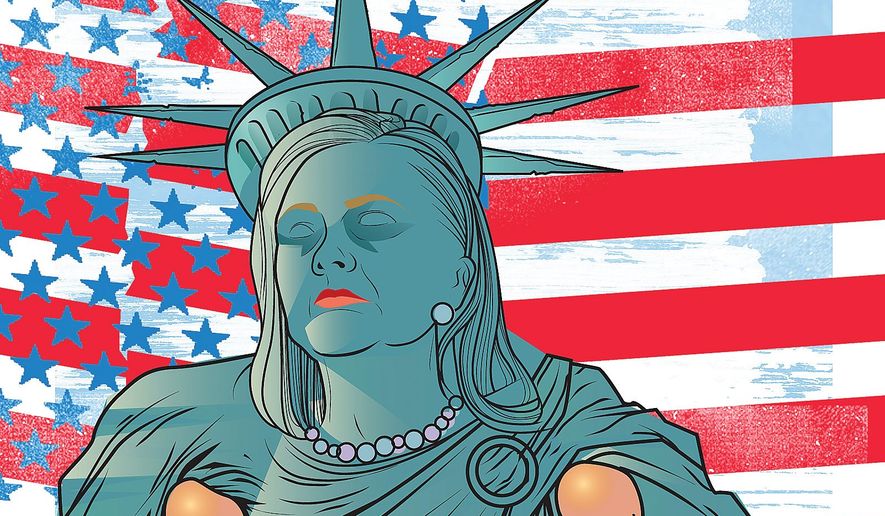OPINION:
Four years ago, you could have almost seen Bill Clinton’s thought bubble as he watched Barack Obama’s weak and listless performance against Mitt Romney during the first presidential debate: “I can’t believe we lost to this guy.”
Mr. Clinton never would have mailed it in the way Mr. Obama did. He may have lost some of his old magic, but he’s still got the golden touch.
His wife, however, never had it — and clearly never will, as evidenced by her plodding and grating debate performance against Donald Trump this week. At the same time, Mr. Trump was aggressive, projecting authority even when he was on relatively shaky ground. Unlike others who have opposed her, he didn’t care that she was a Clinton or a Democrat or a woman. He didn’t defer to her, offer special treatment or allow her a wide berth for Clintonian parsing.
Relishing his outsider role, he positioned her squarely in her role of status quo incumbent. By doing so and by clearing the bar of appearing a reasonable man and plausible president, he lived to fight another day.
Because he’s never done this before, voters give him a lot more running room to make mistakes and find his bearings. The fact that he more than held his own on the biggest political stage on earth is astounding. The traditional metrics don’t apply to this candidate or this election year, which is why he was able to walk away not just intact but perhaps stronger.
In terms of political strengths, Mr. Trump appeared every bit the non-politician, the gifted television presence, the spontaneous and charismatic force of nature. Mrs. Clinton showcased her deep resume while presenting herself as the next historically unprecedented choice riding the next identity-politics wave.
In terms of political weaknesses, Mr. Trump whiffed on hitting her on her private email server, the Clinton Foundation, leveraging her public position to enrich herself, Benghazi, her serial lying about all of this and more. He had flashes of impatience and defensiveness and often lapsed into self-reference when he should have kept his answers focused on the future of America.
Mrs. Clinton, meanwhile, was predictably dissembling, non-transparent and obtuse while permitting the unknowns — particularly about her health — to remain unknown. She looked every inch the global elitist, and condescension dripped from her every pore. Not a good look for her.
In terms of major narrative vulnerabilities, Mrs. Clinton could not speak convincingly of the Clinton Foundation, her server or email scandals nor of her portfolio as secretary of State (Libya, Benghazi specifically, the Russian reset, the rise of China, the Iranian nuclear deal, the failure to support key allies such as Israel, the decision to release known terrorists from Guantanamo Bay).
It helped that she wasn’t asked about these things by the moderator, Lester Holt, who posed general questions to her while asking pointed questions to Mr. Trump, which forced him on the defensive. She also could not speak convincingly of the economy or Obamacare, given that she is the grandmother of socialized medicine and Obamacare is already in its predicted death spiral. Again, she got an assist from Mr. Holt, who didn’t bring it up.
Mr. Trump struggled to speak convincingly about Russia or Ukraine or nuclear doctrine. But one of his best moments was when she tried to suggest that he’s unprepared for the presidency. The question, he said, isn’t whether she was in the game. It’s how she played it — and what results she produced: We are now less wealthy, less prosperous, less safe, less secure, less powerful.
On the flip side, Mr. Trump enjoyed major narrative advantages, including the most feeble gross domestic product growth since the end of World War II under Mr. Obama and the attendant weakness in jobs and capital formation; illegal immigration and bad trade deals that have disadvantaged the working and middle classes; the breakdown of law and order in many American communities; and the need to defeat the corrupt, rigged system, reorganize relations with allies and foes, and reawaken American morale.
He managed to exploit some of this, though it would have been more powerful if he had simply pointed to the smoking ruin of the Obama-Clinton economy and foreign policy and said, “We tried it your way.”
Mrs. Clinton had the narrative advantage of the first Clinton administration economy, 1993-2001; the experience of having dealt with world leaders; Mr. Obama’s popularity; and beating up on Wall Street. Her failure to capitalize on many of these narrative strengths was a major communications failure.
Debates, however, are less about the nuances of policy and more about style, tone, well-timed zingers, and demonstrating the ability to think on one’s feet. He sprinted through the questions with the speed and agility of a leopard; she plodded through them with all of the grace of a three-legged rhinoceros.
The scene is now set for the balance of the campaign. The race remains in the air, barring some unforeseen plot twist.
In the end, however, Mr. Trump did one critical thing that went largely unnoticed. He stated implicitly — which he should have stated far more explicitly — that we don’t have to settle for the crippled America Mr. Obama and Mrs. Clinton have given us.
The power to turn it around rests with us.
And by making that clear, Mr. Trump scored the only point that really matters.
• Monica Crowley is editor of online opinion at The Washington Times.




Please read our comment policy before commenting.